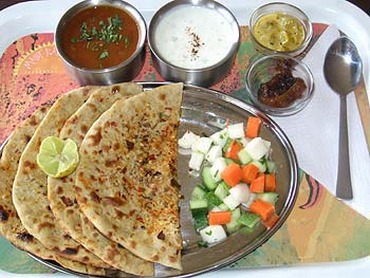
Food inflation is high. But it is possible to beat it by being a smart food shopper. Here are the tips that can help...
These days you're busy cutting costs. What used to be a jolly ride in a cool cab to work has turned into an hour-long jostling session in a bus. The last you wore new clothes was when George W Bush was still US President. And you've even forgotten what it's like to watch a movie in a multiplex.
With good reason. A huge chunk of your bread and butter these days is going into exactly that -- bread and butter.
Food prices are soaring and it's hard to cut costs there. But not entirely. Here are 13 ways to trim the fat from your food bills every month.
1. Home food is better
Those frequent trips to the food court next door are not as cheap as you like to think they are. Because they include not just the price of food but also cost of service, ambience and air-conditioning, taxes, waiter's tip, etc, etc. Even a small eatery will cost more than eating at home.
If you are a foodie and can't imagine a life without different kinds of cuisines you just can't replicate at home, at least try to minimise your eating-out-sessions. So if you have been eating out, say, thrice a week, cut it down to once.
Watch your waistline and your food budget shrink.
2. Make a list
Before heading out to the next-door supermarket with your grocery bag, make a list of what you need, including the quantities. This will help you resist the impulse to throw everything colourful and in attractive packaging into your shopping cart.
Stick to the list strictly... unless of course you forgot to add an essential item to it. Doing so will ensure you buy only what you need, and not what you want.
...
The author is co-founder and director of Bangalore-based Perfios Software Solutions Private Limited. www.perfios.com is a personal finance software solution that provides a 360-degree view of your personal finance, with very little manual intervention.

Also keep a budget in mind. After you are done filling your shopping cart, see that the total is not more than your budget. If it is, you are sure to find some items in your cart that can be removed to bring the total below your budget.
We all tend to pick up things we don't always need and can do without. Sticking to budget will help you beat this tendency.
4. Shop on full stomach
It's purely psychological. When hungry, you tend to buy everything edible in sight. So make sure you go shopping when your stomach's full and your taste buds satiated. This will help keep out quick-fix foods and snacks from your shopping cart.
Click NEXT to continue...

Many supermarkets have one day in the week -- mostly a weekday -- when they offer discounts and special schemes. Do some R&D around your area and find out which store's discount schemes falls on which day. If you are not store-specific, you can go to different stores on different days depending on your needs.
This works best for branded items, which cost the same everywhere. However, be careful not to buy things you don't need only because they are on discount. This will inflate, not cut, your food budget.
6. Bulk up
When it comes to buying routine items you know you will have to stock up again next month, go for the big pack.
More often than not, they come cheaper than smaller packs. Don't blindly follow this tip. Check the price of both small and big packs and see if the larger pack comes with a smaller price tag when calculated on a per unit basis.
Think of how much you will be able to save if many items in your list come in value packs.
However, don't apply this logic to perishables. When it comes to perishable items, buy only as much as you need to prevent any wastage.
Click NEXT to continue...

Here's one secret revealed by a retail industry mole supermarkets place the expensive stuff at eye level and the cheaper stuff down. This is because the shopper has a tendency to grab whatever is easily accessible. Check the lower shelves for bargain buys and cheaper brands. And don't be scared to experiment with different brands. Cheap is not always lower in quality than the expensive. The trick is to find the right brand.
8. Avoid cooked packaged food
The living-by-the-minute lives we lead these days have made convenience foods, well, convenient. But that packaged cooked palak paneer comes at a price several times the one made at home. Unless strictly needed, avoid them not just because they're expensive but they also have little nutritional value (and even taste) compared with the real thing.
Click NEXT to continue...

Mahatma Gandhi's principles apply to food shopping, too. Local foods are much cheaper than exotic, imported ones because they escape taxes and other costs. In a globalised world, supermarkets are flooded with exotic foods, fruits and chocolates from other countries.
But they come at a price that is much higher than the locally grown. Remember to check the price tag before reaching out for that imported can of pickled octopus.
10. Be smart to gimmicks
Use your smarts while shopping. It's not for nothing that advertising and marketing salaries are very high.
'Sugar-free' doesn't always mean healthy or even low-calorie.
'Organic' is okay if you're willing to shell out twice the cost of ordinary.
'New and improved' probably means a better package, which you will discard anyway.
A number of labels are applied to products to make them sound snazzier. So even if 80 per cent of women agree that this shampoo lowers hair fall, make sure to check the '*' down. It probably means 80 per cent of the 10 women they surveyed said so.
Don't give in to smart marketing gimmicks. Use your own intelligence to cut out the white noise.
Click NEXT to continue...

Sure, it's easier to pick up vegetables while you're shopping at the local supermarket. But that convenience will cost you. Most supermarkets inflate the prices of vegetables and fruits and don't even leave any room for bargaining. Your local vegetable or fruit vendor will probably give you the same (or even fresher) stuff at half the cost. Go that extra mile.
12. Read expiry dates
When you're buying food products, make sure you read the label for expiry dates. The further the expiry, the lower the chances of wastage. While the rule is more important for perishables, even non-perishable items have expiry dates that you should read before buying.
Less wastage will mean more money in your pocket.
13. Check the bill
Not just at the checkout for any mistakes but also at home once you get a chance to review your purchases. This will tell you what's costing how much and you can think of ways to minimise costs.
For example, if a particular ingredient is costing more and can be substituted with a cheaper alternative, do so by all means. If a particular brand is costlier than another one, make the switch if possible. A long look at the bill tells you clearly where you can cut costs.
Food is a necessity, not a luxury. The good news is this necessity can cost only how much you want it to. Let the tips above guide your hand... and your pocket.